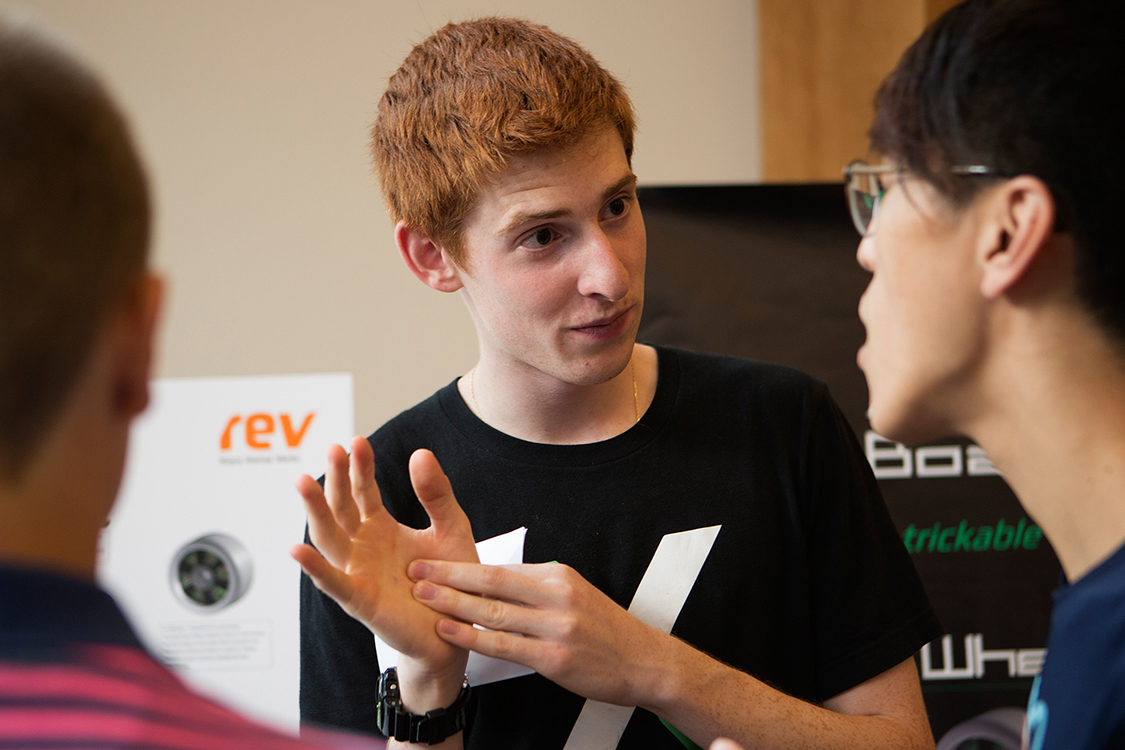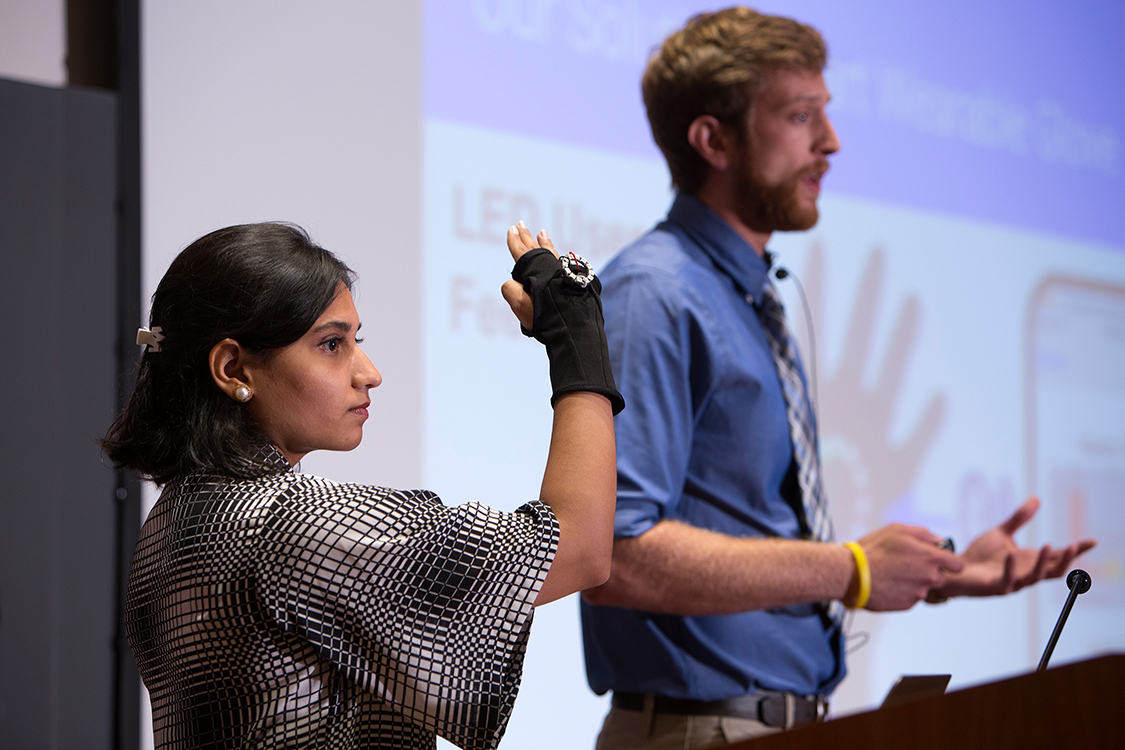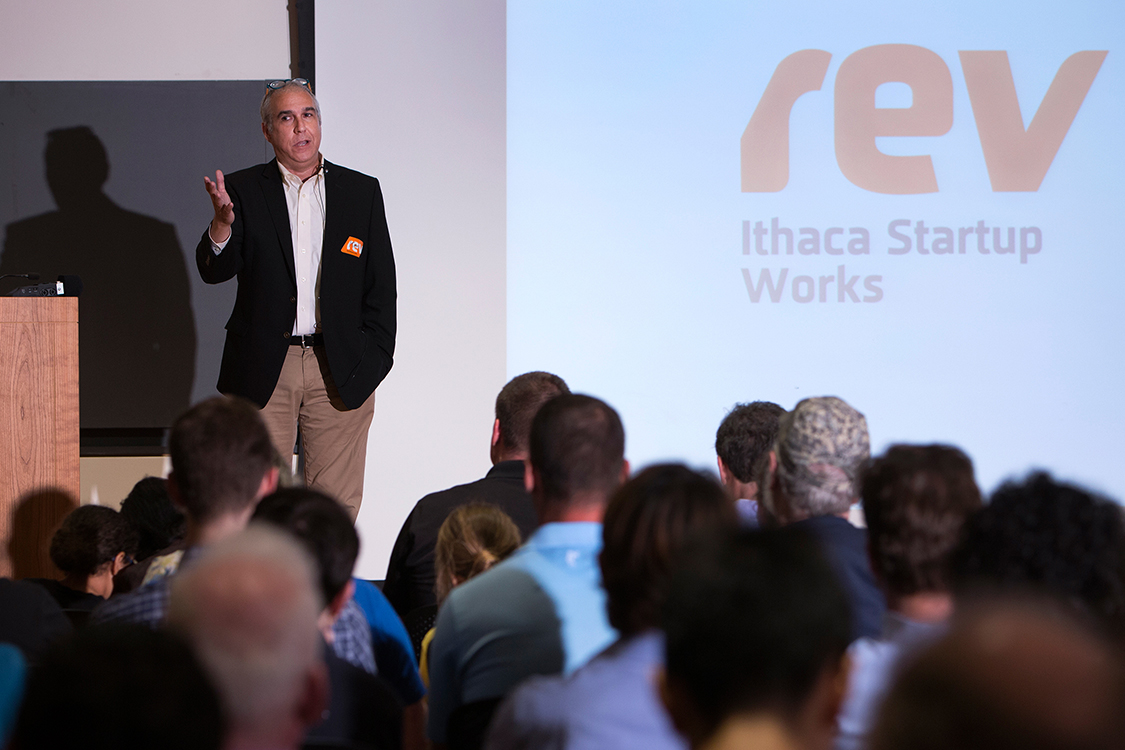Rev Demo Day offers showcase for budding entrepreneurs
By Tom Fleischman


Rev: Ithaca Startup Works is a place where people with little more than an idea for a new product can go for the tools they need to tackle the world of entrepreneurship.
Aligning Rev with Cornell, one of New York state’s premier research universities, is a natural partnership, says Tom Schryver, visiting lecturer of entrepreneurship at the Samuel Curtis Johnson Graduate School of Management and executive director of Cornell’s Center for Regional Economic Advancement.
“I think from Cornell’s perspective, what happens on campus is stronger if we have a strong startup community in town,” Schryver said. “And the community is stronger if Cornell – as well as Ithaca College and Tompkins Cortland Community College – participates in that startup environment.”
Eight new entrepreneurial teams, fresh off a rigorous 12-week training and mentoring program at Rev’s East State Street facility, were showcased on campus during the second annual Rev Hardware Accelerator Demo Day, Aug. 11 in the Biotechnology Building.
Approximately 170 people attended the event, giving the public a chance to see the fruits of the teams’ labor and budding entrepreneurs the opportunity to practice their pitches with a captive audience.
“It was an opportunity for the entrepreneurs to show their progress, talk about the problem they’re trying to tackle and get people interested,” said Ken Rother, Rev Hardware Accelerator program director.
“It’s very early-stage, and opportunities like this represent a checkpoint along the way,” he said. “The teams can show what they came in with, what they achieved, what they want to do next.”
The evening began with each of the eight teams meeting attendees and demonstrating their products. Rother said the teams all succeeded, despite the unique challenges each faced.
“We had everything from a team that included three Ph.D. biomedical engineers, to a team of three business students that probably never soldered a wire in their life,” he said. “If you look at what people came in with, and what they’re leaving with in terms of their business and technical skill sets, we’re very happy.”
Eric Berg ’19, majoring in electrical and computer engineering and computer science, is CTO of X-Board, which aims to make powered skateboards on which skaters can perform tricks. Currently, he said, the only powered skateboards on the market are longer ones used strictly for transportation.

Their invention involves a motorized skateboard and a sensor-driven glove; as the wearer’s hand clenches, the board goes faster.
“We came into Rev Hardware Accelerator really trying to advance our prototype,” Berg said. X-Board's co-founder is CEO Jeffrey Ly, M. Eng. '16. “So we learned a lot about how to get an idea off the ground, how to start working with off-the-shelf parts, create something that’s close to what we want, and then how to iterate to the next step.”
The first pitch the night was made by Hunter Hartshorne, Ithaca High School Class of 2016, who along with classmate Jasper White founded Hillside Hydro to make a small, water-driven generator that can charge electronic devices.
Rother was impressed with the pair’s ambition.
“In the middle of the program, we told them that you had to go out and talk to customers,” he said. “So they went to the Adirondack Trail, camped beside a stream for a weekend and talked to 60 people about what devices they were carrying in their backpack and how they charged [them].”
Other presenting teams and their products:
FlexIt (engineering graduate students Trusha Parekh, Jason Guss, Will Weinlandt, Fnu Apoorva and Pankaj Singh): A glove outfitted with LED lights and sensors that can signal when the hand is in a position that could put the wearer at greater risk for carpal tunnel syndrome or other repetitive strain injuries.
Koala Clock (Zach Leidig, MBA ’17; Kevin O’Brien, Ph.D. Eng. ’19): An analog clock with digital functionality; the clock face illuminates wedges of time, allowing children to visualize their planned events to better perceive and manage time.
ProjecTicker (Cameron Burbank, rising sophomore at Quinnipiac University): An ambient, wall-based display system connected to the user’s phone via an app. Users can display any information they choose in scroll form.
Remote Science (Ithaca resident Joe Chipalowsky): A cloud-based system for monitoring the performance and operational status of HVAC equipment in residential and small commercial buildings.
Specdrums (Steven Dourmashkin, M. Eng. ’16; Matt Skeels ’16):A wearable ring that can play music by tapping it on various colors.
StopPack (Ithaca College students Alex Horner, Sethavatey Limsreng, Aniebietabasi Ekong): An electronic cigarette case that tracks the user’s habit and organizes the data via an app. The information can be shared with a support group of the user’s choosing.
Media Contact
Get Cornell news delivered right to your inbox.
Subscribe